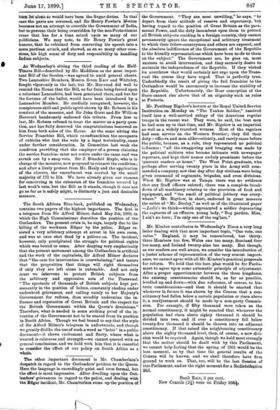Mr. Ponitney Bigelow's lecture at the Royal United Service Institution
on Monday on "The Yankee Soldier," resolved itself into a well-merited eulogy of the American regular troops in the recent war. They were, he said, the beat men he had seen up to that time, and Mr. Bigelow is an impartial as well as a widely travelled witness. Most of the regulars had seen service on the Western frontier; they did their duty—officers and men alike—silently, and rarely came before the public, because, as a rale, they represented no political influence: "all the swaggering and bragging was made by the political soldiers who became intimate with newspaper reporters, and kept their names unduly prominent before the ignorant readers at home." The West Point graduate, who perhaps after serving twenty years in the Army still com- manded a company, saw that day after day civilians were being given command of regiments, brigades, and even divisions. When Mr. Bigelow was at Tampa there was no evidence that any Staff officers existed; there was a complete break- down of all machinery relating to the provision of food and equipment, and " the smell of political jobbery was every- where." Mr. Bigelow, in short, endorsed in great measure the satire of "Mr. Dooley," as well as of the illustrated paper —Leslie's we think—which represented a soldier deprecating the raptures of an effusive young lady, " Beg pardon, Miss, I ain't no hero; I'm only one of the reglars."






































 Previous page
Previous page